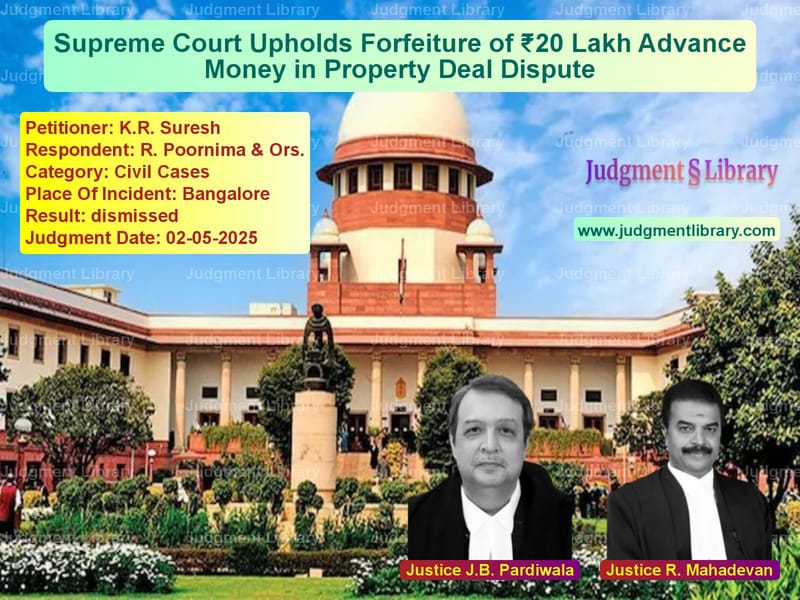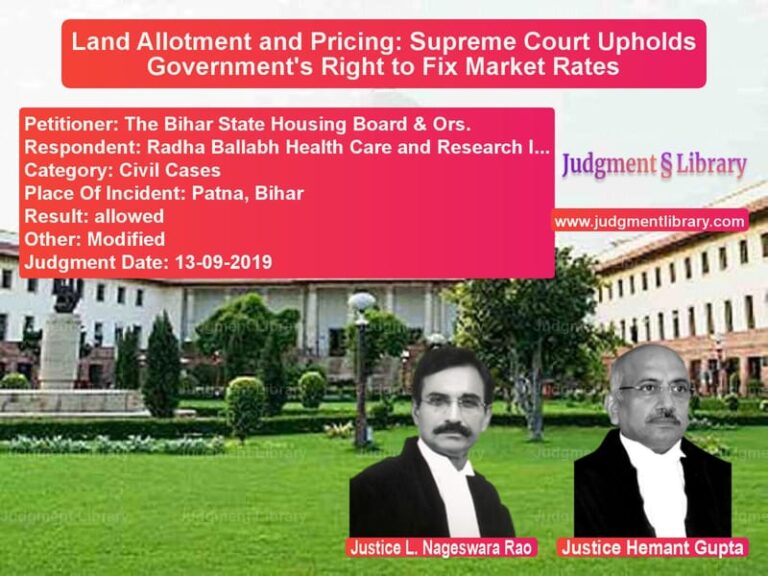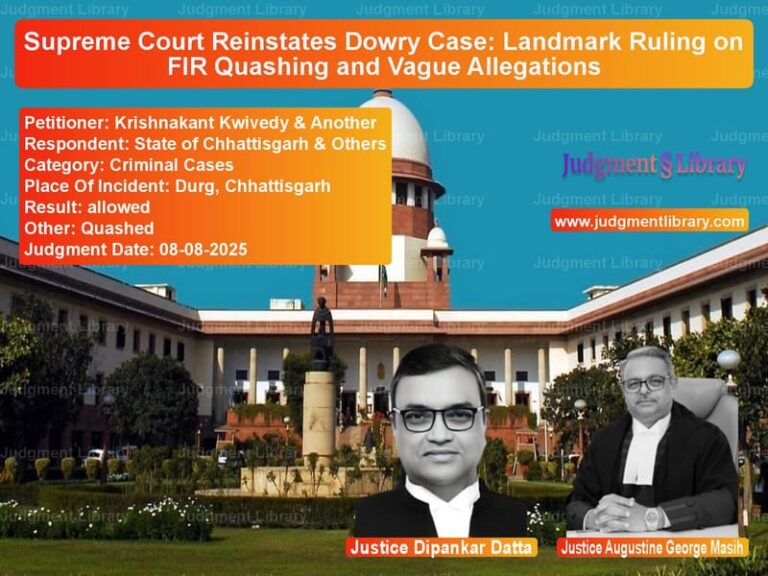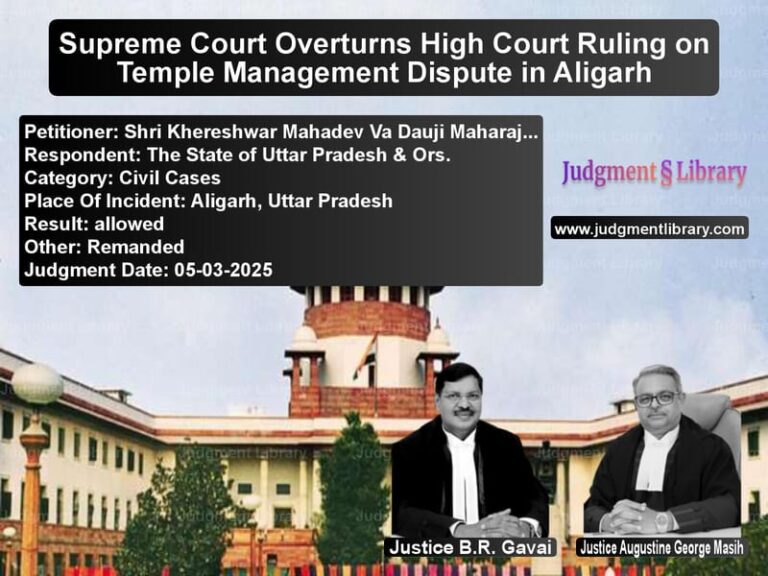Supreme Court Upholds Forfeiture of ₹20 Lakh Advance Money in Property Deal Dispute
In a significant ruling that clarifies the legal distinction between earnest money and advance payments in property transactions, the Supreme Court has dismissed an appeal seeking refund of ₹20 lakhs paid as advance money for a property purchase in Bangalore. The judgment delivered on May 2, 2025, brings finality to a legal battle that began in 2008 over a property deal that went sour.
The case centered around an Advance Sale Agreement (ATS) dated July 25, 2007, where K.R. Suresh (the appellant) agreed to purchase a property from R. Poornima and others (respondents) for ₹55.50 lakhs. Suresh paid ₹20 lakhs as advance money through two cheques, with the balance of ₹35.50 lakhs to be paid within four months. However, the transaction never materialized, leading to multiple rounds of litigation.
The Property Deal That Went Wrong
The dispute began when Suresh claimed that upon approaching a bank for a loan to purchase the property, he was advised to secure original title documents and a probate certificate since the respondent had acquired the property through an unregistered will. According to Suresh, despite repeated requests between September 2007 and February 2008, the respondents failed to provide these documents.
However, the respondents had a different story. They contended that they urgently needed the sale consideration money to avail of a One-Time Settlement benefit from Indian Overseas Bank, which was time-bound for three months. They argued that time was of the essence in the contract, and Suresh failed to pay the balance amount within the stipulated four-month period.
The ATS contained a crucial clause: “In the event failure on your part to pay the remaining amount within stipulated period, the advance amount paid by you will be forfeited. In the event failure on our part to execute the sale deed, even though you are ready to pay the balance sale consideration and get registration of sale deed, in such an event we agreed to pay the double amount of the advance which you have paid as compensation.”
When Suresh failed to complete the payment within four months, the respondents forfeited the advance money and subsequently sold the property to another party for ₹38.40 lakhs in February 2008.
The Legal Battle Begins
Aggrieved by the forfeiture, Suresh filed a suit in 2008 seeking specific performance of the contract or, alternatively, declaration that the subsequent sale was not binding on him. However, he did not specifically pray for refund of the advance money in his original plaint.
The Trial Court dismissed Suresh’s suit in 2012, holding that he had failed to prove his readiness and willingness to perform the contract. The Court noted that Suresh had no documents to show he had sufficient funds to pay the balance consideration and had issued his legal notice only after the four-month period had lapsed.
The High Court affirmed the Trial Court’s decision in 2021, additionally noting that Suresh had not sought alternative relief of refund of advance money as mandated by Section 22 of the Specific Relief Act, 1963.
Arguments Before the Supreme Court
Before the Supreme Court, Senior Counsel Mr. Anand Sanjay M. Nuli appearing for Suresh made several key arguments. He submitted that “the defendant no. 1 failed to obtain the promised probate certificate with respect to the suit property despite multiple requests from the plaintiff.”
He further argued that “the defendant no. 4 has specifically admitted that between 18.02.2008 and 20.02.2008, the plaintiff voluntarily offered to pay an additional Rs.10,00,000/- beyond the agreed sale consideration of Rs.55,50,000/–.” According to Mr. Nuli, this admission proved the readiness and willingness of Suresh to fulfill his part of the contract.
Mr. Nuli also contended that the respondents exhibited mala fide intent by selling the property to another party for ₹38.40 lakhs within just two months after the expiry of the stipulated four-month period. He asserted that “no prior notice had been served on the plaintiff before forfeiting the advance sale consideration or executing the sale deed in favour of the defendant nos. 5 and 6 respectively.”
Most importantly, Mr. Nuli argued that Suresh was entitled to refund of the advance money as an alternative relief, relying on previous Supreme Court judgments.
On the other side, Ms. Supreeta Sharanagouda, representing the original property owners, pointed out that “the plaintiff, in his cross-examination, admitted that he had no documents to show that he possessed the requisite amount to pay the balance sale consideration.”
She emphasized that “having regard to the fact that the balance sale consideration of Rs.35,50,000/- was to be paid within four months from the date of the execution of the ATS, time was evidently the essence of the contract.”
Ms. Sharanagouda also defended the forfeiture clause, arguing that “pursuant to the recitals in the ATS, there was consensus between the parties with respect to the forfeiture of advance money in the event of the purchaser’s default in fulfilling the terms of the agreement.”
The subsequent purchasers, represented by Mr. Dhawesh Pahuja, argued that they were bona fide purchasers without notice of the prior agreement. He contended that “it would be too much to ask the bona fide purchasers to refund Rs.20,00,000/- to the appellant/plaintiff. Such a liability ought to be fastened upon the party guilty of suppression, i.e. the respondent/defendant nos. 1-4.”
The Supreme Court’s Analysis
The Supreme Court bench comprising Justice J.B. Pardiwala and Justice R. Mahadevan delivered a comprehensive judgment analyzing two main issues: the validity of the forfeiture of advance money, and the law on alternative relief of refund under Section 22 of the Specific Relief Act.
The Court made a crucial distinction between “earnest money” and “advance money,” noting that while these terms are often used interchangeably, they have different legal implications. The Court explained: “The word ‘advance’ means money in whole or in part, forming the consideration of an agreement paid before the same is completely payable. On the other hand, the word ‘earnest’ stands for a sum of money given for the purpose of binding a contract, which is forfeited if the contract does not go off and adjusted in price if the contract goes through.”
The Court referred to its earlier judgment in Shree Hanuman Cotton Mills v. Tata Air Craft Ltd., which laid down the principles governing earnest money: “It must be given at the moment at which the contract is concluded. It represents a guarantee that the contract will be fulfilled or, in other words, ‘earnest’ is given to bind the contract. It is part of the purchase price when that transaction is carried out. It is forfeited when the transaction falls through by reason of the default or failure of the purchaser.”
After examining the agreement and circumstances, the Court concluded that the amount of ₹20 lakhs, though termed as “advance money” in the ATS, was essentially “earnest money” in nature. The Court observed: “In a fashion akin to earnest money, the said amount was paid at the very execution of the ATS. It was meant to be adjusted against the total sale consideration of Rs.55,50,000/- if the transaction was carried out, which is evident from the ATS clause that states the balance sale consideration to be as Rs.35,50,000/-. Further, it was liable to be forfeited in the event that the transaction fell through by reason of the default on part of the purchaser.”
The Court also addressed the issue of whether time was of the essence in the contract, referring to Chand Rani v. Kamal Rani: “From an analysis of the above case-law it is clear that in the case of sale of immovable property there is no presumption as to time being the essence of the contract. Even if it is not of the essence of the contract the Court may infer that it is to be performed in a reasonable time if the conditions are: 1. From the express terms of the contract; 2. from the nature of the property; and 3. from the surrounding circumstances, for example: the object of making the contract.”
Considering the urgent need of funds for the One-Time Settlement and the specific four-month timeframe in the agreement, the Court held that time was indeed of the essence in this contract.
On the Alternative Relief of Refund
The Court extensively examined Section 22 of the Specific Relief Act, which deals with power to grant relief for possession, partition, refund of earnest money, etc. The provision states: “No relief under clause (a) or clause (b) of sub-section (1) shall be granted by the court unless it has been specifically claimed: Provided that where the plaintiff has not claimed any such relief in the plaint, the court shall, at any stage of the proceeding, allow him to amend the plaint on such terms as may be just for including a claim for such relief.”
The Court emphasized that “the expression ‘at any stage of the proceeding’ has been judicially interpreted to include the appellate stage as well.” However, the Court noted that Suresh had never sought amendment of the plaint to include a prayer for refund of advance money at any stage of the proceedings.
The Court referred to its recent judgment in Desh Raj v. Rohtash Singh, where it was held: “On a plain reading of the above-reproduced provision, we have no reason to doubt that the plaintiff in his suit for specific performance of a contact is not only entitled to seek specific performance of the contract for the transfer of immovable property but he can also seek alternative relief(s) including the refund of any earnest money, provided that such a relief has been specifically incorporated in the plaint. The court, however, has been vested with wide judicial discretion to permit the plaintiff to amend the plaint even at a later stage of the proceedings and seek the alternative relief of refund of the earnest money. The litmus test appears to be that unless a plaintiff specifically seeks the refund of the earnest money at the time of filing of the suit or by way of amendment, no such relief can be granted to him. The prayer clause is a sine qua non for grant of decree of refund of earnest money.”
The Court rejected Suresh’s argument that the general prayer for “such other relief(s) as the Hon’ble Court deems fit” could be construed to include a prayer for refund of advance money. The Court stated: “In our considered opinion, the law contained under Section 22(2) of the 1963 Act is adequately broad and flexible to allow the appellant to seek an amendment of the plaint for the said relief, even at the appellate stage. However, no such application for an amendment of the plaint was moved either before the trial court or during the course of the first appeal before the High Court. That is to say, the appellant never prayed for the refund of the advance money. Here, it would be redundant to state that the law aids the vigilant, not those who sleep over their rights.”
Court’s Final Ruling
After comprehensive analysis, the Supreme Court concluded: “For all the foregoing reasons, we have reached the conclusion that the forfeiture of advance money by the respondent nos. 1-4 was justified. In such circumstances, we are not inclined to grant the relief of refund of advance money to the appellant.”
The Court found no perversity or illegality in the High Court’s judgment and accordingly dismissed the appeal. The ruling reinforces the importance of carefully drafting prayer clauses in civil suits and understanding the legal implications of advance payments in property transactions.
The judgment serves as a crucial reminder to property buyers and sellers about the significance of clear contractual terms, the distinction between earnest money and advance payments, and the necessity of specifically claiming alternative reliefs in litigation. For the legal community, it provides valuable clarity on the application of Section 22 of the Specific Relief Act and the circumstances under which forfeiture of advance payments will be considered valid.
Petitioner Name: K.R. Suresh.Respondent Name: R. Poornima & Ors..Judgment By: Justice J.B. Pardiwala, Justice R. Mahadevan.Place Of Incident: Bangalore.Judgment Date: 02-05-2025.Result: dismissed.
Don’t miss out on the full details! Download the complete judgment in PDF format below and gain valuable insights instantly!
Download Judgment: k.r.-suresh-vs-r.-poornima-&-ors.-supreme-court-of-india-judgment-dated-02-05-2025.pdf
Directly Download Judgment: Directly download this Judgment
See all petitions in Contract Disputes
See all petitions in Property Disputes
See all petitions in Specific Performance
See all petitions in Damages and Compensation
See all petitions in Judgment by J.B. Pardiwala
See all petitions in Judgment by R. Mahadevan
See all petitions in dismissed
See all petitions in supreme court of India judgments May 2025
See all petitions in 2025 judgments
See all posts in Civil Cases Category
See all allowed petitions in Civil Cases Category
See all Dismissed petitions in Civil Cases Category
See all partially allowed petitions in Civil Cases Category







